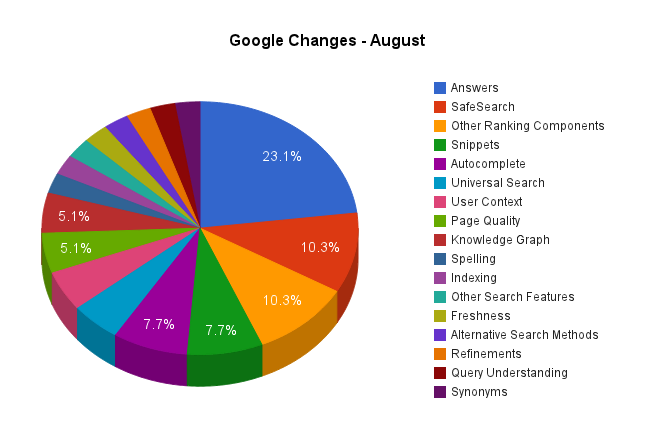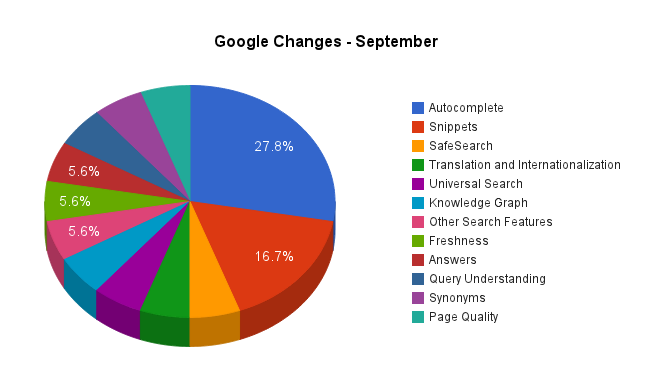The biggest SEO story last Friday was Penguin 3. Two days before that, the biggest SEO story was Panda 20. And just a few days before that, the biggest SEO story was the EMD update.
Needless to say, it’s been a wild week in the world of SEO. So wild, in fact, that many people completely missed Google’s announcement about the August and September algorithm changes.
But fear not! This post is all about the August and September changes so if you were too busy chasing pandas and penguins last week, this will bring you up to speed…
August Changes
Google announced 41 changes in August. 10 of the changes have descriptive names (e.g., “TSSPC”, “Palace”, etc.), and 31 of them have ID numbers (e.g., #82279, #84010, etc.).
Interestingly, less than 25% of the August changes have a descriptive name. This percentage is significantly lower than the corresponding percentages for the June and July algorithm changes (51% and 50%, respectively).
Similar to the June changes, the August changes are grouped into 17 “project” categories. The following pie chart shows the percentage breakdown for each of the categories:

Since 8 of the 17 categories contain a single change, I’ve reassigned many of the changes to make the categories more meaningful. With that in mind, here is a summary of the most important categories:
Answers
This category contains the most changes, and all of the changes improve one of two things: (1) the interpretation of various query types or (2) the display of results associated with various query types. The updated query types include the following:
- Movie Showtimes – You suddenly have one less excuse for missing the opening credits.
- MLB – I prefer every other sport over baseball, but Google improved MLB search just in time for the stretch run.
- Finance – They improved the display for finance queries, and they added support for stock exchange voice queries.
- Local Time – Now, it’s easier than ever to figure out your local time.
- Conversions – They improved the natural language processing and display of conversion queries (e.g., currency conversions, arithmetic conversions, etc.).
- Flights – Flight search appears even without a specified destination.
Other Ranking Components
This is the second largest category, and it is essentially a catch-all for various ranking-related changes.
The most notable change in this category (#82279) says the following: “We changed to fewer results for some queries to show the most relevant results as quickly as possible.” This is interesting for at least two reasons.
First, this change explains the SERP shrinkage that was originally identified by Dr. Pete. Between August 12-14, he observed that over 18% of the Mozcast-monitored keywords began returning SERPs with only 7 results (as opposed to the traditional 10 results). The following graph illustrates this shift:

Second, the change’s wording is extremely odd. Supposedly, this change was made to show the most relevant results as quickly as possible. Since the traditional SERPs with 10 results take less than a second to generate (i.e., an imperceptible amount of time), SERPs with 7 results should only provide a marginal speed improvement.
Call me a conspiracy theorist, but it seems like this change was only made to promote more ads (and generate more ad revenue). Let’s assume that the average user looks at 15 organic results (this is a purely hypothetical figure). These new SERPs will require the user to view 3 pages of ads (as opposed to 2 pages of ads with the previous SERPs). More ads = more opportunities for the user to click = more opportunities for Google to make money.
In addition to the SERP shrinkage change, this category also includes 4 changes (LTS, nearby, #83377, and #84586) that make search results more locally relevant. Unfortunately, none of the change descriptions explain exactly how the results are made more relevant. They just use vague language such as the following: “We made improvements to show more relevant local results.” Um, yeah: that’s VERY helpful.
Finally, this category includes a number of miscellaneous changes. These changes include a vague “minor” bug fix for link-based ranking (#83709), an update to term-proximity scoring (#83135), a more granular function for identifying stale content (Imadex), etc.
Page Quality
This category only includes two changes, but they are arguably the month’s most important changes.
The first change (#84010) is a data refresh for the Panda algorithm (this was originally labeled Panda 3.9.1, but it’s also being called Panda 18). This was Google’s official announcement on Twitter:
Panda data refresh this past Monday. ~1% of queries noticeably affected. More context: goo.gl/wQRZ0
— A Googler (@google) August 22, 2012
The second change (#83689) uses the same vague language as the Page Quality changes made back in June: “This launch helped you find more high-quality content from trusted sources.” Ah, Googlespeak. So vague. So nondescript. So incredibly frustrating.
Knowledge Graph
This category also only includes two changes, but the Knowledge Graph is clearly important to Google. More and more searches utilize the Knowledge Graph, and it headlines the list of features in their search engine of the future post, which is referenced numerous times in the August and September changes.
The specific changes in this category (#83443 and Knowledge Graph Carousel) focus on adding lists and collections to the Knowledge Graph and expanding the Knowledge Graph Carousel globally in English.
Miscellaneous
This category includes a wide range of changes that are not related to the previously discussed changes. These include SafeSearch improvements (e.g., filtering more adult content), better snippet generation, more relevant Autocomplete query suggestions, etc.
September Changes
Google only announced 19 changes for September. 4 of these changes have names (e.g., “Cobra”, “trafficmaps”, etc.), and 15 of them have an ID number (e.g., #81999, #83304, etc.).
Continuing with the trend mentioned above, only 21% of this month’s changes have a descriptive name, which is lower than the corresponding percentages for June, July, and August. Either Google is getting less creative, or they’re afraid of inadvertently revealing information with the descriptive names.
This month’s changes are grouped into 12 “project” categories, which is absurd since there are only 19 of them (i.e., each category has an average of 1.6 changes). Oh well. Here’s the relative popularity of each category:

Similar to the July changes, the September changes are incredibly boring. So instead of wasting time on elaborate descriptions, let’s just knock them all out in a big list:
- Autocomplete – These changes improve autocomplete query predictions.
- Snippets – These changes generate more relevant snippets for webpages and non-html documents.
- SafeSearch – This change improves adult content detection.
- Translation and Internationalization – This change improves language detection.
- Universal Search – This change adds a traffic map for traffic-related queries.
- Knowledge Graph – This change influences when Knowledge Graph summaries should be shown.
- Other Search Features – This change improves language translation suggestions.
- Answers – This change improved the precision of the symptoms search feature.
- Query Understanding – This change improved searcher intent detection (with respect to multimedia searches).
- Synonyms – This change improved the use of synonyms to return more relevant results.
Missing Changes
The most interesting changes on the September list are the ones that are missing. Specifically, the three biggest news items in September were Panda 19 (September 18), Panda 20 (September 27), and the EMD update (September 28). None of them are mentioned in the September changes.
There is one Page Quality change (#84394) that uses my favorite vague description: “This launch helped you find more high-quality content from trusted sources.” However, it does not explicitly mention Panda. And even if we attach it to one of the Panda updates, that still leaves another one that is completely ignored.
Interestingly, there isn’t a single change that corresponds to the EMD update. The only September change that even mentions the word “domain” is a Freshness change (#83761) with the following description: “This change helped you find the latest content from a given site when two or more documents from the same domain are relevant for a given search query.” This change might help with keyword cannibalism, but it doesn’t appear to have anything to do with exact match domains.
So the obvious question is… why were these changes omitted from the list? You could argue that Google already mentioned them in other official announcements, but that’s inconsistent with how Google handled similar changes in previous lists (e.g., previous Panda refreshes were publicly announced AND included in the change list — just look at the August list for a recent example). The question remains, and unfortunately, I don’t have an answer… yet.
What Do You Think?
I’d love to hear from you in the comments. Which of these changes had the biggest impact on the search results? What other observations have you made about the August and September changes?
[…] Google releases a list of their August and September algorithm changes: Search quality highlights: 65 changes for August and September. For an analysis of these changes, please read Demystifying Google’s August & September Algorithm Changes. […]